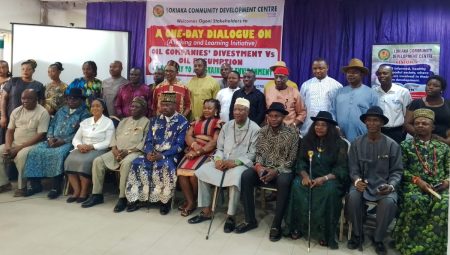
– Tackles Nipa Palm invasion
Mkpoikana Udoma
Port Harcourt — In a bold move to combat the spread of invasive Nipa palm and save the Niger Delta’s wetlands, the Nigerian Conservation Foundation, NCF, has planted over 15,000 mangroves across three hectares in Andoni Local Government Area, Rivers State.
The initiative, funded by the Aspire Coronation Trust Foundation, seeks to restore the region’s biodiversity while addressing ecological damage caused by Nipa palm (Nypa fruticans) which has displaced native mangroves vital for marine life, carbon sequestration, and community livelihoods.
Senior Officer for Climate Change and Nature-Based Solutions at NCF, Shittu Usman, said the mangrove planting was part of a larger conservation project designed to combat the spread of Nipa palm, which has displaced native mangroves and threatened biodiversity across Nigeria’s wetlands
Usman speaking at the official launching of the Nature Sustainable Multipurpose Cooperative Society for the people of Andoni trained by NCF to produce marketable household items from Nipa palm, emphasized the long-term benefits of the project.
He urged the beneficiaries to make use of the cooperative, assuring that NCF through ACT Foundation would support the beneficiaries through stipends in the cooperative account with Rivers State Microfinance Agency.
“This is a critical step in reviving Andoni’s wetlands, which are not only vital for biodiversity but also for the livelihoods of the local community.
“We’ve planted over 15,000 mangroves, and they’re already germinating. In six months to a year, we’ll see these trees flourishing, restoring the habitat and supporting marine life like periwinkles, fish, and crabs, which the community depends on.
“Andoni is renowned as a biodiversity hotspot, home to species like hooded vultures and elephants. The reintroduction of mangroves is expected to provide a safe haven for these species, enhance carbon sequestration, and combat coastal erosion.
“This is not just about planting trees. It’s about restoring an entire ecosystem. Mangroves are crucial for maintaining the ecological balance, and their presence ensures the survival of countless species that depend on this habitat.”
While the initiative is slated to end in 2025, its impact is expected to last a lifetime. “These mangroves will continue to grow and benefit the community for generations. Already, we’re seeing increased periwinkle populations in areas where we’ve planted, and this is just the beginning,” Usman added.
The project also empowers Andoni residents by turning the problem into an opportunity, as NCF trained the people of Andoni to repurpose Nipa palm into marketable household items, creating economic value from what was once an ecological menace.
According to local craftspeople, Nipa palm leaves are now being transformed through weaving into biodegradable products such as baskets, handbags, and hand fans.
A beneficiary from Ataba in Andoni, Mr. Owajiochit Ibani, explained the process of using Nipa palm leaves to craft souvenirs like baskets, handbags, hand fans, flower vase, slippers, etc. “All you need is Nipa palm leaves, you gather them fresh and get them to dry up, then craft them into anything of your choice.”
Another beneficiary from Unyeada in Andoni, Miss Unyana Abel, explained that crafts produced from Nipa palm were environmentally friendly as they were biodegradable.
“Nipa palm has always been a burden to us and so instead of cutting it down and throwing it away, we have discovered a way of converting waste to wealth. So we are using products of Nipa palm as natural fabric to weave many things.”
Earlier, Director of Forestry at Rivers State Ministry of Agriculture, Mrs. Nkem Udoaya, lauded the project, describing mangroves as critical to the Niger Delta’s future.
“Mangroves absorb carbon and are home to aquatic life. The advocacy for mangrove restoration cannot be overemphasized,” she said, while highlighting the newfound economic potential of Nipa palm.
Similarly, Dr. Grace Alawa, Executive Director of Sustainable Action for Nature, warned of dire consequences if mangrove restoration efforts fail.
“Nipa palm has already taken over 25% of the mangrove forests in the Niger Delta. If this trend continues, we risk losing the mangroves entirely within half a century. This would devastate biodiversity, fisheries, and the livelihoods of millions.”



